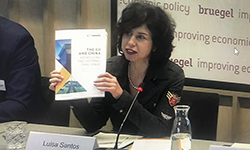BusinessEurope Headlines No. 2020-09
Discussing the EU industrial strategy with Commissioner Breton

"In today’s world, where Europe is accelerating its green and digital transformations and where other parts of the world use aggressive policies, with some playing outside of the rules, Europe needs to act more strategically. The industrial ecosystems and strategic value chains like batteries, hydrogen or the Internet of Things will be key to pool public-private finance and bring new technologies to the market”, stressed BusinessEurope President Pierre Gattaz in a meeting with the European Commissioner for Internal Market Thierry Breton and Markus J. Beyrer, Director General of BusinessEurope. The meeting took place on 11 March – one day after the publication of the European Commission’s new industrial strategy. In the context of the Green Deal, which BusinessEurope supports, Beyrer emphasised the importance of addressing the risk of carbon and investment leakage in order to maintain Europe’s attractive business location in the long-run. To this end, strengthening our existing tools to tackle carbon and investment leakage is essential. Lastly, President Gattaz underlined the importance to urgently take action responding to the economic consequences of the current COVID-19 situation in the spirit of responsibility and solidarity.
Contact: Antonia Bierbaumer
Our comment
EU industry to lead green and digital transitions
By Antonia Bierbaumer, Adviser on Industrial Affairs
 The European Commission presented its renewed industrial strategy on 10 March 2020, which was long-awaited by industry representatives. Although at least five strategies have been published since 2005, the political momentum accompanying this one can hardly be overlooked.
The European Commission presented its renewed industrial strategy on 10 March 2020, which was long-awaited by industry representatives. Although at least five strategies have been published since 2005, the political momentum accompanying this one can hardly be overlooked.
The EU has decided to take the lead in transforming to a new model. The Green Deal will only be an economic success if the EU Industrial Strategy ensures industry competitiveness throughout this massive transformation. The strategy pitches the narrative that assigns EU industry the role of leading the “twin transition” (green and digital).
The stakes are high for European industry. Companies fully stand behind the EU’s objective of becoming climate neutral. To reach that objective, it is key to equip industry with the right framework conditions to stay competitive to successfully master the challenges ahead. Although the Green Deal offers new possibilities and markets for clean technologies to companies, it would be a mistake to neglect the challenges it accompanies. For instance, in the absence of comparable ambitions from our main global competitors, we run the risk of carbon and investment leakage towards more attractive business locations. This topic is now in debate with the Carbon Border Adjustment (CBA) mechanism. But we should be careful that CBA does not cannibalise everything. The strengthening of existing tools such as free allowances and state aid for indirect costs in the emissions trading system will be decisive.
Unfair competition and market distortions must be addressed on all fronts. European competition policy should be adjusted to today’s market realities by taking better into account the international dimension of markets. A fair level playing field has become a critical issue as European companies increasingly face unfair competition around the world. Many of the distortions stem from foreign subsidies and state-owned enterprises. The initiative to develop a tool to address foreign subsidies and mitigate market distorting practices from third country’s companies, that are heavily subsidised, is a step in the right direction.
Europe needs to act more strategically and see the bigger picture. The strategy introduces a new approach of “industrial ecosystems” as the new way of thinking and working to lead the twin transition. While the Strategic Value Chains (SVC) concept is not very prominent, the strategy revives the concept of “Industrial Alliances” building on the experiences of the European Battery Alliance. New alliances should be established in the areas of hydrogen, low-carbon industries and industrial cloud and platforms. It remains to be seen how the ecosystems will integrate the SVC concept.
The true value of the industrial strategy will be determined by the Commission’s implementation of concrete measures. The progress of implementation will be regularly monitored based on a set of key performance indicators (KPIs). Although these KPIs still need to be defined, it gives prove of the Commission’s dedication to the strategy. To really make a change this time, we proposed the establishment of a “sounding board” consisting of high-level business representatives. The business representatives would support the Commission in the challenges ahead and serve as a strategic resource. The strategy foresees an inclusive “Industrial Forum” with representatives from various stakeholders, EU Member States and EU institutions.
With the right framework and measures in place, EU industry stands ready to take on the leading role in the transition process.
Contact: Antonia Bierbaumer
Companies need fair competition
 “The EU should act on all fronts - multilateral, bilateral and unilateral - to address unfair competition from third countries. The EU should also make good use of existing tools in the field of trade policy and competition policy”, said BusinessEurope Deputy Director General Luisa Santos on 9 March at the Bruegel event “Global competition and digital change: How should we update European competition policy?” in Brussels. She pointed out that if needed these tools should be revised and adjusted to today’s market realities, for instance by taking better into account the international dimension of markets and effectively addressing the distortions generated by foreign subsidies. EU state aid rules, Santos added, only arrange for a level playing field in the internal market and should be strengthened to control market distorting practices from third country’s companies, especially state-owned enterprises that are heavily subsidised. EU merger policy and public procurement rules also have a role to play. “The EU market should remain open to trade and foreign investment but the EU should ensure that European and foreign companies compete under the same rules”, she stated.
“The EU should act on all fronts - multilateral, bilateral and unilateral - to address unfair competition from third countries. The EU should also make good use of existing tools in the field of trade policy and competition policy”, said BusinessEurope Deputy Director General Luisa Santos on 9 March at the Bruegel event “Global competition and digital change: How should we update European competition policy?” in Brussels. She pointed out that if needed these tools should be revised and adjusted to today’s market realities, for instance by taking better into account the international dimension of markets and effectively addressing the distortions generated by foreign subsidies. EU state aid rules, Santos added, only arrange for a level playing field in the internal market and should be strengthened to control market distorting practices from third country’s companies, especially state-owned enterprises that are heavily subsidised. EU merger policy and public procurement rules also have a role to play. “The EU market should remain open to trade and foreign investment but the EU should ensure that European and foreign companies compete under the same rules”, she stated.
![]()
![]() Contacts: Luisa Santos/Erik Berggren
Contacts: Luisa Santos/Erik Berggren
EU carbon market state aid crucial for Green Deal
 BusinessEurope believes that the revision of the EU Emission Trading System (EU ETS) state aid guidelines can provide a unique win-win situation for both climate ambition and European industry’s competitiveness, thereby being a key policy instrument to implement the European Green Deal. In order to make that happen, BusinessEurope provided a set of key recommendations to the European Commission on how to make the draft new guidelines fit-for-purpose. For more info, see our submission to the public consultation.
BusinessEurope believes that the revision of the EU Emission Trading System (EU ETS) state aid guidelines can provide a unique win-win situation for both climate ambition and European industry’s competitiveness, thereby being a key policy instrument to implement the European Green Deal. In order to make that happen, BusinessEurope provided a set of key recommendations to the European Commission on how to make the draft new guidelines fit-for-purpose. For more info, see our submission to the public consultation.
![]() Contact: Leon de Graaf
Contact: Leon de Graaf
Finnish industry hosts discussion on EU-China relations
 “Addressing the systemic challenge posed by China’s state-led economic system requires a comprehensive approach both by the EU and its Member States”, said Maurice Fermont, Senior Adviser at BusinessEurope, at a roundtable discussion organised by the Confederation of Finnish Industries (EK) in Helsinki on 10 March. He pointed out that since bilateral and multilateral efforts to ensure a level playing field between China and the EU have not produced any meaningful result in recent years, the onus is now on Europe to explore what autonomous measures it can take to rebalance its relationship with China. Finland ranks well compared to other EU countries on some measures. For example, it is one of only half of EU Member States that has a foreign direct investment screening mechanism in place. “Nevertheless, it is important to raise awareness at national level on the problems business faces and the proposals we have made that could address them”, Fermont said. BusinessEurope’s new China strategy consists of four key goals and 130 recommendations on how to achieve them. “Connecting both the foreign and trade agendas with other domestic agendas is an important element of the whole-of-government approach required to rebalance the relationship”, he concluded.
“Addressing the systemic challenge posed by China’s state-led economic system requires a comprehensive approach both by the EU and its Member States”, said Maurice Fermont, Senior Adviser at BusinessEurope, at a roundtable discussion organised by the Confederation of Finnish Industries (EK) in Helsinki on 10 March. He pointed out that since bilateral and multilateral efforts to ensure a level playing field between China and the EU have not produced any meaningful result in recent years, the onus is now on Europe to explore what autonomous measures it can take to rebalance its relationship with China. Finland ranks well compared to other EU countries on some measures. For example, it is one of only half of EU Member States that has a foreign direct investment screening mechanism in place. “Nevertheless, it is important to raise awareness at national level on the problems business faces and the proposals we have made that could address them”, Fermont said. BusinessEurope’s new China strategy consists of four key goals and 130 recommendations on how to achieve them. “Connecting both the foreign and trade agendas with other domestic agendas is an important element of the whole-of-government approach required to rebalance the relationship”, he concluded.
![]() Contact: Maurice Fermont
Contact: Maurice Fermont
Calendar 
- 16 March: Eurogroup/EcFin
- 18 March: European Commission releases communication on updating the Skills Agenda
- 18 March: European Commission adopts Human Rights 2020 Action Plan
- 23 March: BusinessEurope publishes Reform Barometer
Reminder: please have a look at our privacy policy